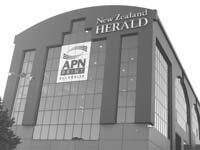22 November 2008
APN decision to outsource “a dark day”
1 June 2007
By Justin Henehan and Angus Bennett: Te Waha Nui Online
 |
| Australian media giant APN plans to cut costs by outsourcing its subediting work to another Australian company. |
A “dark day for news and democracy” is how the journalists’ union describes APN News & Media’s move to contract out subediting of its newspapers and magazines.
From July, Australian production company Pagemasters will subedit newspaper and magazine content for APN publications from all over New Zealand. Its production facility will be in Penrose, Auckland.
Subeditors are senior journalists who write headlines and check stories for accuracy, grammar and spelling.
Affected publications include New Zealand Herald, The Listener, The Northern Advocate, Bay of Plenty Times, and The Star.
New Zealand journalists are represented by the Engineering Printing and Manufacturing Union. The EPMU estimates the move will see 70 jobs lost up and down the country — an estimate APN says is “close to the mark”.
Pagemasters will eventually employ up to 50 subediting staff at its Auckland production facility, says Rick Neville, deputy chief executive of APN’s New Zealand publishing division.
“The number of editorial production staff in Auckland will actually increase over what exists now,” he says.
Record profits
Increasing profit and efficiency is the rationale behind APN’s decision, despite the Australian media giant achieving record profits in 2006.
Macquarie Bank adviser and former journalist Richard Inder says the move in New Zealand is a symptom of an emerging media battle across the Tasman.
“The cuts serve their purpose by creating higher profits. This increases APN’s ability to borrow against their assets, giving them more firepower.”
He says New Zealand newspapers are being used to pump up APN international’s share price so it can jump into the Australian media war with as much money as possible.
Neville says APN has a duty to its shareholders “to continually look for new efficiencies”.
But APN already makes tens of millions of dollars in profit out of its New Zealand interests, says EPMU national secretary Andrew Little in a statement.
“Now they’re trying to squeeze out a little more and it’s going to come at the cost of decent jobs and news quality.
“The move shows APN’s priority is the bottom-line profit, rather than providing quality news to New Zealanders,” says Little.
Most page design on The New Zealand Herald will remain in-house, while editing of content will be done by Pagemasters.
Pagemasters’ subeditors will work in shifts, checking content on pages from several different publications at a time — a process that will lead to errors, says Herald union delegate Simon Collins.
“It’s an intensification of the process. They’ll be under pressure to [subedit] a certain amount of pages an hour,” he says.
Accuracy concerns
The EPMU says the result will be less in-depth coverage, a decline in accuracy, and some stories left untold.
Neville disagrees: “Pagemasters can manage the high page traffic volume. Each page will be checked at local level before being sent to print.
“The commercial agreement APN has negotiated with Pagemasters provides for financial penalties if standards of quality and accuracy are not met,” he says.
But Collins says when subediting is removed from community newspapers, a decline in accuracy is inevitable.
“With time the connection between local newspapers and their communities will be lost.”
The connection between journalists and subeditors will also be lost — a relationship Collins says is crucial to producing journalists capable of quality reporting.
“There will be a loss of wisdom. Subeditors have the institutional memory in place. They pick up errors reporters don’t know about.”
“Subeditors play a mentor’s role to young reporters — they’re the old hands you go to as a reporter.”
Neville says each paper will retain a core “back bench” of senior news editors and sub-editors that will continue to carry out the mentoring role.
But a statement, Little describes APN’s move to “assembly-line subediting” as an attack on the New Zealand news media and its democratic function.
“This is a dark day for our members but also for news and democracy in New Zealand. New Zealanders rely on the news for quality information about what’s happening in their country and in their communities and base important decisions on that information.
“It’s time to make media companies take responsibility for their role in the democratic process rather than let them simply chase profits,” Little says.


